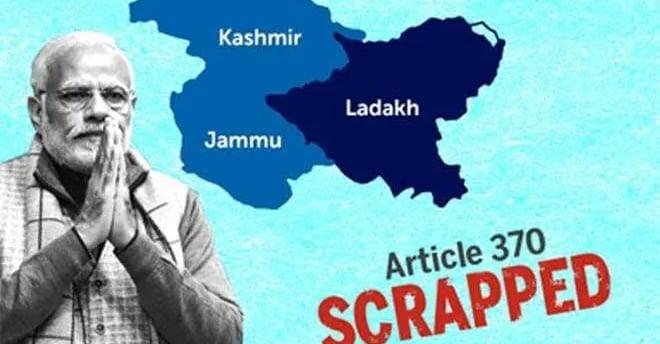Satyamev Jayte
Abrogation of Article 370
By Rriddhi Parasher
5/26/20243 min read


Introduction:
On 11 December 2023, a five-judge bench of the Supreme Court of India unanimously upheld the Indian Government's decision to abrogate Article 370. The bench said that article 370 of the Constitution was a 'temporary provision' and the president had the power to revoke it. The abrogation of Article 370 in August 2019 marked a historic moment in the legal landscape of India, particularly in the context of Jammu and Kashmir. This constitutional amendment, which revoked the special status accorded to the region, triggered a series of legal developments aimed at fostering equality, integration, and uniformity in the legal framework governing Jammu and Kashmir.
Legal Developments:
The abrogation of Article 370 catalysed significant legal reforms, reshaping the legal framework governing Jammu and Kashmir and aligning it with the constitutional provisions applicable to other states of India.
1. Equality and Integration: Article 370 conferred special autonomy upon Jammu and Kashmir, resulting in a separate set of laws and provisions governing the region. However, its abrogation ensured that Jammu and Kashmir became fully integrated into the Indian Union, subject to the same constitutional provisions as other states. This move was instrumental in fostering a sense of equality among all Indian citizens and promoting the territorial integrity of the nation.
2. Extension of Central Laws: One of the immediate consequences of abrogating Article 370 was the extension of numerous central laws and provisions to Jammu and Kashmir. Previously, the region enjoyed certain exemptions and special privileges under Article 370, leading to discrepancies and complexities in the legal framework. However, the abrogation of Article 370 facilitated the application of central laws related to citizenship, property rights, welfare schemes, and other areas to Jammu and Kashmir. This alignment of laws ensured uniformity and consistency in legal practices across the country, promoting efficiency and transparency in governance.
3. Enhanced Security Measures: The special status accorded to Jammu and Kashmir under Article 370 had implications for security measures in the region. It often hindered effective coordination between the central government and security forces in addressing challenges such as terrorism and insurgency. However, the abrogation of Article 370 facilitated better cooperation and coordination between the central government and security agencies, enabling more robust security measures to be implemented. This has led to improved security and stability in the region, crucial for fostering an environment conducive to development and investment
4. Promotion of Gender Equality: Another significant aspect of the legal reforms following the abrogation of Article 370 was the promotion of gender equality in Jammu and Kashmir. Previously, certain laws and provisions in the region differed from those applicable in the rest of India, leading to disparities in rights and protections for women. However, the abrogation of Article 370 paved the way for the extension of gender-equal laws to Jammu and Kashmir, thereby enhancing women's rights and legal protections. Women in the region now enjoy rights to inheritance, property, and representation on par with their counterparts in other parts of the country.
5. Constitutional Amendments: The abrogation of Article 370 necessitated amendments to various constitutional provisions to reflect the changes in the status of Jammu and Kashmir. This included amendments to Article 367, which governs the interpretation of the Constitution, as well as other related provisions. These constitutional amendments were crucial in ensuring the legal validity and effectiveness of the abrogation of Article 370 and the integration of Jammu and Kashmir into the Indian Union.
On May 22nd 2024, the Supreme Court has dismissed review petitions challenging its decision to uphold the abrogation of Article 370, which provided special status to Jammu and Kashmir. These petitions contested the Court's December 2023 ruling, which affirmed the removal of Article 370, arguing that it was a temporary provision. The Supreme Court reiterated that the abrogation was constitutionally valid.
Conclusion:
The abrogation of Article 370 brought about a paradigm shift in the legal landscape of Jammu and Kashmir, paving the way for greater equality, integration, and uniformity in the legal framework governing the region. The legal developments following the abrogation of Article 370 have not only strengthened the constitutional fabric of India but also promoted the principles of justice, equality, and rule of law. While challenges remain, particularly in terms of implementation and reconciliation, the legal transformations initiated by the abrogation of Article 370 have laid the foundation for a more inclusive, equitable, and integrated future for Jammu and Kashmir within the Indian Union.
SUBSCRIBE TO OUR NEWS LETTER
AMRITA JAISWAL & ASSOCIATES
Address: Chamber No. 417, Saket District Court, New Delhi, 110017
Mob: +91-9319013053
Email: advamritajaiswal@gmail.com
